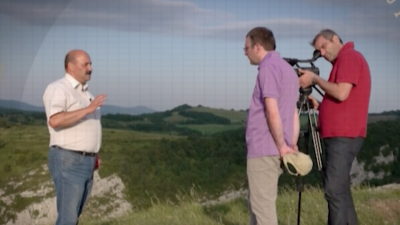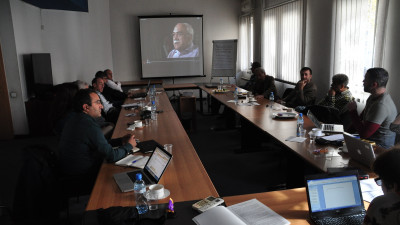In a letter released today, experts in conflict resolution and human rights, call on the French and Spanish governments to release Basque prisoners who are vulnerable to COVID-19 or are eligible for parole. The letter is signed by over 100 hundred people, including Conciliation Resources’ Executive Director Jonathan Cohen. Read the full statement below.
Working in three contexts - Central African Republic, Myanmar and Nigeria (the hubs) - Smart Peace is implemented by a specialist consortium led by Conciliation Resources, in partnership with International Crisis Group, Centre for Humanitarian Dialogue, The Asia Foundation, ETH Zurich, Behavioural Insights Team and Chatham House. Through combining expertise to ensure a comprehensive and adaptive approach to peacebuilding, Smart Peace aims to see key stakeholders involved in conflict resolution, including communities, better supported to manage change peacefully. This introductory film provides an overview of Smart Peace’s approach and what this means in each of the programme’s hubs.
Today, Chatham House is hosting the first expert roundtable event on Smart Peace online. With the number of violent conflicts increasing, there is a worldwide need to respond more effectively. Smart Peace is a global consortium created to improve peacebuilding in fragile and conflict-affected states.
This roundtable, which was postponed due to COVID-19, is an opportunity for Smart Peace partners to share the Smart Peace concept, approach and objectives, and experiences of the first phases of programme implementation. Smart Peace partners will be joined remotely by UK government officials, representatives from embassies, and other international organisations working on peacebuilding.
The war that broke out in Nagorny Karabakh in September 2020, leaving as many as 7,000 dead and displacing 130,000 people in just 44 days, was another tragic and bloody instalment in the decades-long conflict between Armenians and Azerbaijanis.
Recounting the story of this protracted conflict up to 2016, the 'Parts of a Circle' documentary film trilogy covers the outbreak of war in the dying days of the Soviet Union, the war itself, and the failed attempts to secure peace. The films recount events up to the outbreak of the major escalation known as the ‘4-day war’ in April 2016, after the stalling of negotiations and an accelerating military build-up along the Line of Contact.
Every year, the months of January-April are crowded with traumatic commemorations in both Armenian and Azerbaijani national calendars. Seeing the bitter online exchanges during this time, one could be forgiven for thinking that history should be left alone.
Yet societies affected by violence need an internal dialogue on the violent past. Many conflicts generate complex combinations of victims and perpetrators, necessitating difficult conversations for post-war societies on how they distinguish right and wrong – even under the most extraordinary circumstances imposed by war. This imperative is reflected in the fact that reconciliation is no longer seen in peacebuilding practice as a utopian aspiration or a ‘soft’ add-on. Questioning how its history is transmitted – what is foregrounded and whose voices are omitted – is healthy for any nation. This is all the more relevant in the South Caucasus today as a new generation with no memory of 1990s violence grows up.
Conciliation Resources is joining leading mediation and peace support organisations to establish a range of measures which ensure their work is complementary and collaborative. The following statement of intent has been agreed with the Berghof Foundation, the Carter Center, the Centre for Humanitarian Dialogue, CITpax, CMI, European Institute of Peace, Forward Thinking, Inter Mediate, and Sant'egidio.
As COVID-19 takes hold in the UK and elsewhere, we’re being asked to put our faith in our government, our health officials and security services. To put our lives on hold, to stay at home, and to trust that this is the best way to slow the spread of the disease. It’s hard to overstate how important this trust is, because in West Africa we experienced what happens when this trust isn’t there – and just how vital local peacebuilders are for building a bridge between communities and government institutions.

Twenty five years ago, Conciliation Resources began with two second-hand computers and a shared office space. We might have grown to over 60 staff, but our core principle remains that people living in areas of violent conflict should be involved in its resolution. In this film, our founders Andy Carl and David Lord discuss their vision for Conciliation Resources when the organisation first began, what changes they’ve seen over the past 25 years and why they think peacebuilding is more important than ever.
mediatEUr’s SEO Kathrin Quesada took the floor on Wednesday evening as a panellist for an engaging discussion on international mediation in intractable conflicts. She appeared alongside EIP’s Senior Advisor Hilde Johnson at the Young Professionals in Foreign Policy (YPFP) organised event.
Women’s involvement in peace processes is vital for sustainable peace. But, in peace processes between 1992 and 2018, women represented only 3% of mediators, 4% of signatories and 12% of negotiators. Women Mediators across the Commonwealth (WMC) is a network that brings together women from different backgrounds and with different experiences of mediating conflict to learn from each other. The network advocates for greater recognition of the crucial work done by women mediators at all levels - from the local to the global.
mediatEUr has worked to support peace processes since 2007 and provides conflict prevention and mediation support to the European External Action Service (EEAS). We strongly advocate for creative and inclusive peace processes that generate sustainable outcomes. Our “VOICES of Syria” project was devised in 2019 to connect the voices of Syrian refugees to the processes determining the conditions and visions for peace in Syria.











